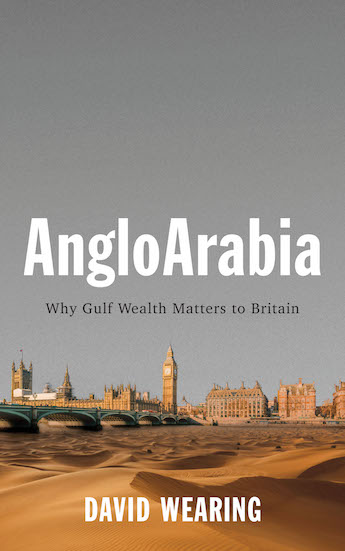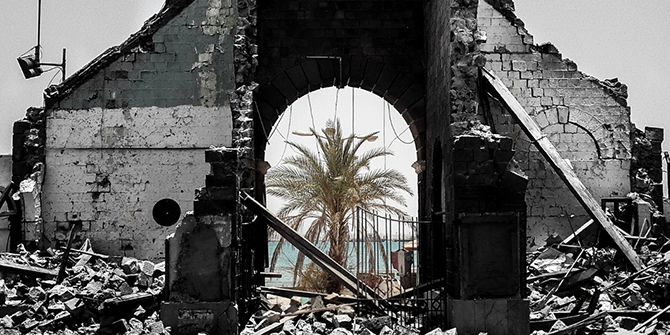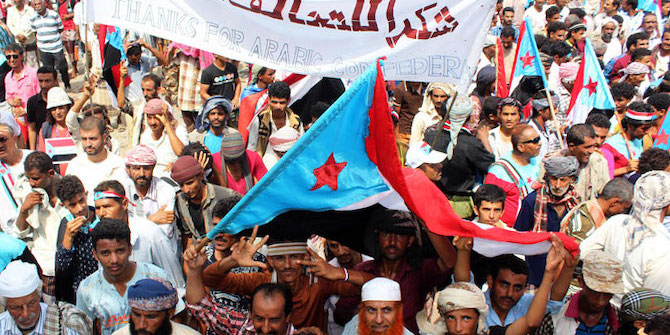by Courtney Freer
The UK’s close relationship with the Gulf, and particularly the monarchies of the Gulf Cooperation Council, stems from both a long history of engagement and Britain’s enduring need to project power on the global stage even as its military and economic clout wanes. David Wearing has traced this relationship in a new book, which, though thin on theory, is a thorough descriptive resource for non-experts and a useful call for policymakers.
In his book AngloArabia, one of the first pieces of this length and depth to cover the topic of why and how the Gulf matters so much to British foreign policy, David Wearing examines the United Kingdom (UK)–Gulf Cooperation Council (GCC) relationship in the modern era. In so doing, he discusses the geostrategic, as well as economic, importance of the Gulf states. Wearing traces the relationship through three phases: the first spanning the end of the eighteenth century until the end of World War II, when Britain became ‘an imperial hegemon and power-broker in the Gulf;’ the second from the start of the Cold War until 1971 when London withdrew from the Gulf; and the third in the period up to the present day when Britain has ‘adjusted to its new status, working to ensure that its financial and industrial sectors (particularly arms exporters) benefited from the increased wealth of the Gulf monarchies and, to that end, providing those monarchies with the arms and protection necessary to ensure their survival’ (12).
Wearing draws three conclusions about the British empire’s legacy in the Gulf. First, he points out that the relationship was forged between governing elites on both sides to benefit British power and monarchies in the Gulf (44). Second, oil and petrodollars have been of central importance to the UK–GCC relationship (45). Third, Gulf capital remains significant for the perpetuation of both British capitalism and global power due to the enduring ties between the two (45).
Wearing next discusses the importance of Gulf oil and gas as a source of geostrategic power, as providing energy for the global economy, as a site of capital accumulation for world energy firms, and as a source of petrodollars which can then be ‘recycled back into the global economy to the advantage of major capitalist states’ (47). He highlights, critically, that Britain does not rely on the GCC directly for oil and gas, with imports having decreased after the 1970s oil crisis and discovery of North Sea oil (52). Wearing thus posits a dual logic when it comes to energy ties between the UK and GCC: first for energy security and second for geopolitical leverage (58). He aptly points out how the rise of national oil companies (NOC) in the global south such as nationalised Gulf oil companies has actually diminished market share for large UK-based international oil companies like BP and Shell while also pointing out that ‘the centre of gravity of the downstream industry is now shifting to Asia, where the IOCs are not well placed’ (68). As a result, the post-Cold War era has seen the consolidation of international oil companies (68–9). Wearing further mentions the important case of how Emirati petrodollars granted that country the political leverage to demand a political Islam enquiry in the UK (79–80).
Wearing next discusses the symbiotic relationship between British neoliberalism and Gulf capitalism. Echoing the more theoretically sophisticated arguments advanced by Adam Hanieh, Wearing points out that ‘state and capitalist interests are inter-linked and complementary. This does not mean that governments are narrowly at the service of individual corporations or concentrations of capital’ (85). He writes about the development of the UK’s finance industry at the expense of its manufacturing capabilities, highlighting the importance of capital inflows, particularly from the Gulf, in ‘financing the UK’s current account deficit and propping up the pound’ (88). Foreign direct investment (FDI) from the global south, particularly from the Gulf, deposited in global north banks has aided financial centres like the City of London (93). As Wearing summarises, ‘Gulf petrodollars played a key role in the financialisation and neoliberalisation of global capitalism from early 1970s onwards. Recycled petrodollars formed a significant proportion of the loans made to states hit by the oil shock’ (97).
Wearing next assesses the importance of Gulf wealth to British capitalism, positing that ‘in a number of crucial respects, the GCC area is at least as important to British capitalism as the leading global south economies of China and India, and sometimes considerably more so’ (110). He asserts that the combined GCC share as an export market is significant compared to others in the global south, although developed markets are overall the most significant for British exporters (118). Indeed, combined exports to the Gulf Arab region were worth 58 percent of combined exports to BRICS countries, with Saudi Arabia and the UAE the most important markets for the UK (120). Wearing also highlights the stabilising role that Gulf capital can, and has, played in times of financial crisis, citing in particular the bailout of Barclays in 2008 (129). Further, he cites that the City of London is ‘more successful in attracting Gulf capital than any other world financial centre, and Gulf capital inflows are significant in value compared with those from elsewhere in the global south’ (152).
Wearing next takes on the more controversial topic of UK–GCC arms sales, indicating that such sales are ‘not merely a commercial matter’ for the UK, but rather ‘an important mechanism for projecting their power worldwide’ (155). Indeed, military trade allows Britain to remain a global military power, even though it is no longer a world power (156). Such arms sales have proven morally problematic and unpopular, however, since they often go to authoritarian regimes and ‘are viewed by recipients as a seal of political approval and legitimacy’ (156). Wearing cites that the United States, Britain and France have supplied 85 percent of major GCC arms imports since the Cold War, illustrating the impressive volume of this trade (161).
Related to the discussions of arms, Wearing last touches on UK involvement in the Saudi-led intervention into Yemen. He first discusses London’s response to the Arab Spring more broadly, which was essentially to try to maintain ‘the conservative regional order’ (187). The uprisings of the Arab Spring also broadly, beginning in 2009, coincided with an increase in the value of British arms exports to the GCC, primarily to Saudi Arabia (189). As Wearing points out, ‘there was a palpable sense at this time that the GCC monarchs were on alert for any signals that UK support for them in the wake of Arab uprisings might be anything less than fulsome’ (192). A Whitehall review of arms exported to Bahrain led to some arms export licenses being revoked, having demonstrated that some exported equipment had been used for crowd control (196). As a means of explaining such sales, though, ‘the British government tends to claim that the monarchies themselves are agents of moderation and sustainable reform, and that continued friendly engagement is the key to encouraging them further down this path’ (201).
Wearing posits that Whitehall’s explanation for arming its Gulf allies, particularly Saudi Arabia in Yemen, has relied on sectarian divisions rather than on questions of democracy (204). Certainly, the increasingly vocal calls for the halting of arms sales to Yemen have spurred policy change, but instead ‘the Yemen episode illustrates the extent and depth of the Saudi military’s dependence on the UK for support in wartime (military and diplomatic) and the strength of the British state’s committee to support the Saudi kingdom even in the face of considerably pressure and criticism, and in spite of a large volume of evidence that Coalition operations were responsible for extensive civilian casualties and humanitarian suffering’ (211). The chapters on arms sales and Yemen should perhaps mention sales of arms and surveillance to the UAE but instead focuses on Bahrain and Saudi Arabia (212). Although Wearing asserts that the relationship is one of interdependence rather than British dependence on UK customers (214), I am sceptical about the extent to which that is true, particularly given the general waning of British power abroad.
Wearing concludes that the primary significance of the Gulf lies in its vast energy reserves: firstly to stabilise the global economy, secondly for geostrategic power and thirdly due to the importance of petrodollars to leading capitalist states like the UK (216). Indeed, although Britain is not directly dependent on energy exports from the Gulf, disruptions would harm its economy, as would the halting of petrodollars into the British economy (217). In short, then, ‘[t]he region has become a key export market relative to others in the developing world’ (217–18). In terms of Saudi petrodollars in particular, they have helped to finance Britain’s large current account deficit as well as the value of the pound sterling (218). One area which Wearing does not cover but is worthy of attention in my view is the soft power relationship between the UK and GCC, particularly relationships between cultural and education institutions in both region, which help to underpin broader economic and political relations.
On the whole, the book consolidates in one place considerable information about the UK–GCC relationship that has more often been the subject of shorter, more journalistic pieces. In terms of a theoretical contribution, however, the book does not provide much, as it is largely descriptive. As a result, it is a helpful resource for non-experts and a useful call for policymakers perhaps to re-examine the extent to which they finance authoritarian governments in the Gulf.








Thanks for that review. I agree that some theory is required. I also agree that Hanieh’s book, which I have read, is a sophisticated analysis. However, my experience at LSE, for example , tells me that there is too much theory and students generally lack any understanding and knowledge of the record of the UK and the US, and othe rmajor capitalist powers. That makes me wonder whether there is a major problem in the curriculum itself.
Students tend to separate “democracy” from what the western governments, institutions, corporations, including what you have termed ‘soft power’ have done in collusion with autocrats, dictators, etc to maintain global dominance and uneven development in the neocololinal era. That lack of facts and their faith in the system in the”West”, is reinforced by what ithey learn of the benevolent role of NGOs, aid, the World Bank, etc.
In short, I do think that the focus should be first on empirical data, historical events, vested interests and power relations before delving into theory, or at least balancing the two from the beginning. More than once students complained about “the workload and no time to think”, let alone to question the fundamentals.